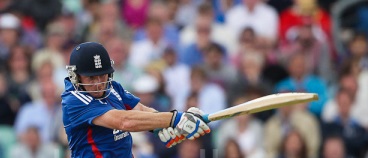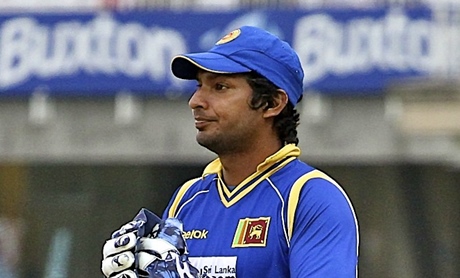After six months of solid one-day cricket, England started the World Cup with a different side. Chris Woakes had been opening the bowling and doing well – he came on first change. Gary Ballance hadn’t played one-day cricket for six months – he came in at number three. James Taylor had been making a decent fist of batting at three – he came in at six.
As well as making a mockery of all the months of World Cup preparation the team had enjoyed, the most striking theme of these changes is that they ‘fixed’ things that didn’t need fixing.
You need long-term plans, but you can’t be beholden to them. Ballance at three makes sense, but if he hasn’t actually been playing cricket and you appear to have fluked a decent number three in the meantime in the form of Taylor, then Taylor becomes Plan A. Similarly, Stuart Broad may well be your first-choice opening bowler, but if he’s had surgery and seems a shadow of his former self, you have to respond to what’s in front of you.
Maybe it’s a labels thing. Maybe the stats program associates data with a name without recognising that the person bearing that name doesn’t always remain a constant. People say England play like robots, but the point is that they really, really don’t and so treating them that way makes no sense.
It’s not really about picking the right players
It’s not even about giving them the right roles within the team. It’s that there’s a way of managing a team. People think that you can pick explosive cricketers and tell them to play with freedom, but that sort of self-expression thrives best in a stable environment.
A lot of people will point at Peter Moores as being guilty of that mismanagement, but is that really fair? England also lost to Bangladesh in the last World Cup and here’s what we wrote this time last year when the Netherlands beat England in the World T20.
“The will to win will always triumph when pitted against a fear of failure,” is one line from that piece and that’s the thing – England’s tournament performances are always absolutely shot-through with a fear of failure.
It’s the culture
It’s not the culture. People say it’s the culture of English cricket, but it’s not. England produces plenty of liberated attacking cricketers. Nor is it the fault of the head coach really. Whoever that is tends to know the value of playing ‘no fear’ cricket. It’s just that they invariably inherit an environment where producing such a thing is almost an impossibility.
There’s an illusion of stability in the way the England cricket team is managed. There are reviews, there are plans and then there’s another revolution. The fear of change and the desire for stability leads to a stubborn marriage to whatever overarching plan is currently considered ‘correct’. There’s intransigence where there should be flexibility and then overreaction when there should be moderation.
Think of it like the moving of tectonic plates. In most cricket nations, they slide. They’re never static, but nor is there much drama. In England, the plate sticks, the pressure builds and then it suddenly lurches forward causing a huge earthquake.
Imagine you’re playing for England
Good cricket requires conviction. The blessed few have this in abundance, no matter what the circumstances, but most rational humans require evidence on which to build their self-confidence. Practice makes perfect and the more times you’ve done something, the more confident you will be that you can perform the task in question.
Today’s England number three was playing his eighth one-day international. The guy he replaced had just played his 16th. The guy he replaced had played 11 one-dayers when he was moved down the order.
Kumar Sangakkara has played 402 one-day internationals and 236 of them at three. In the last two years, he has batted in no other position because he has been looking to practise and perfect his role. You might think that is an unfair comparison, but the point is that even Kumar Sangakkara needs steady, consistent preparation.
It’s not just number three either. This was the 20th time that Moeen Ali had opened the batting in a one-day international and if Ian Bell seems like he’s been the opener for a while, he was out of the side as recently as December.
The Bell example is another good one
People typically have one of two major gripes about Bell right now. One, that he’s too lumpen to open the batting in one-day internationals; or two, that he’s inexplicably playing in lumpen fashion when opening the batting in one-day internationals despite having it in him to play more expansively.
On the face of it, Bell as opener in this World Cup is a ‘plan’. But looked at more closely, they gave him a nice long run-up and then tried to trip him up at the last minute. Having performed well as opener for a couple of years, they shunted him to three last summer and then dropped him after two failures. They brought him back in Sri Lanka – again at three – and then dropped him after one failure and a run-a-ball 35.
Bell is England’s senior one-day batsman – far more experienced than anyone else – and management somehow managed to make him fearful and uncertain of his place in the side just in time for a World Cup. That is quite an achievement. Put him in a team with 10 other people feeling much the same way, add the threat of World Cup elimination, stir in the potential humiliation of losing to Bangladesh and serve. Delicious.
Who’s to blame?
The players are at the pointy-end of a mighty wedge of chaos that is driven into every major world tournament.
Do you blame the cricketers for playing with a fear of failure when they’re inexperienced or undermined and part of a side that’s been cobbled together through luck as much as judgement?
Do you blame the coaching team who inherited a floundering one-day side captained by a Test batsman who shouldn’t have been playing but couldn’t be sacked? After all, they’ve had to cobble together a side in a short space of time after said captain was finally removed within months of the World Cup.
Or do you blame the administrators who make at least five different four-year plans in every four-year cycle – one after each Ashes series, one after each World T20 and one after each World Cup?
They wouldn’t need to do this if England were successful, of course, but where are all the stalwarts on whom that last plan depended? Where’s Pietersen? Where’s Trott? Where’s Bresnan? Where’s Swann? And why do Anderson, Broad, Finn, Morgan and Bopara now seem like wishy-washy watercolour paintings of their former selves?
It’s not that England have problems at World Cups. It’s just that World Cups are when tension and pressure are the greatest and when conviction, self-confidence and experience become most valuable. World Cups are simply where England’s perennial problems come to a head.






I posted the following over a year ago so I’ll just copy and paste it back.
..New head/director/manager is appointed and immediately makes a HUGE decision with the excuse that it is best for the LONG TERM FUTURE PLANS they wish to put in place (remember this bit). This decision is mainly one which benefits internally only. For example, internal disputes etc.
Secondly these ‘long term’ future plans begin to fail but the excuse is, well, just wait and see. These are LONG TERM after all. Such expectations then fail to ever materialize and our Chief then goes on to blame the original decision as one that was FORCED upon them at the time.
They then decide to move on, leaving a mess for someone else to clear up whereas they already have the above as the foundation of all the other excuses lined up for the failure.
Classic executive management at work and Downton is a classic executive.
It’s a good thing England managed to overcome the odds and beat Bangladesh by such a comprehensive margin today, or else we’d have had to invent a fantasy parallel universe to spare us from abject humiliation and have to face up to facts.
Well, I’m glad they screwed up the Test schedule for that. 4 year plans? That felt like a 4 minute plan.
Well done, everyone.
How can it feel like England play way too many ODIs, and yet their most capped player here only had 150 or so caps?
When do the Ashes start?
To quote the Lancastrian hero himself:
“We haven’t got a settled team. We’ve lost two key players at the top of our order [Cook and] Jonathan Trott was the No3, we’ve lost some players and we accept that, we don’t make an excuse of it.
Trott went 15 months ago. More than a year. They lost Cook because he was rubbish at ODI cricket.
Hopefully, Moores doesn’t want to make an excuse of it because it would be the lamest excuse ever made. Why not add that they miss Botham, or that the team would be better if only Shane Warne was still playing and English.
And while we’re on the subject of stuck records (it’s a vinyl thing Sam), I wonder if there are any other world class tried-and-tested ODI players that are missing when they could be playing.
To summarise, fuck off you fucking useless fucking fuckers, because every single thing about what you do makes me fucking sick.
I think it’s time for England to commission a massive statue of an angry looking Paul Collingwood nudging one to the offside for a cheeky single and beneath it the plaque with the following inscription:
3 Ashes Trophies
204- Adelaide 2006
World T20 Winning Captain
Never Forget
They should then put it outside Paul Downton’s office door, either to stop him getting to work or better still to stop him getting out.
Think it’s more than mgmt. and admin problems about this. Good players and their instinct take over at some point. Pakistan prove this, sometimes. I think the English ODI cricket team, and its society, have a lot more to think about. It’s about your place in a new, modern world.
If you mean how English cricket has rushed to commercialise itself via subscription TV and rendered itself an elitist pastime rather than the accessible sport it once was, there’s perhaps some truth in that, but we suspect that’s not what you mean.
The truth is, we don’t really know what you mean.
Excellent analysis, KC. But it all comes back to the basic fact that we don’t care about one-dayers nearly as much as Tests. Give us an Ashes victory and a 6-1 ODI series defeat this summer and all will be forgiven once more.
Bert – my dad used to have a Dire Straits album on vinyl. Brothers In Arms. Those were the days. Weren’t they?
People are always going to care more about one format than another. We fail to see why this means the team can’t win in both (or all three).
South Africa rarely pick Dale Steyn or Vernon Philander for one-dayers because it’s a secondary format to them – but these players return when the World Cup is approaching.
Australia cares about the Ashes just as much as us and despite much chopping and changing, they’ve found an incisive bowling attack and enough good batsmen that they can leave out George Bailey.
Fair points. So remind me, how did we win the T20 World Cup? And why was that formula not replicated in the subsequent years?
Actually, in making last-minute changes in key positions, they pretty much did follow that template.
Probably shouldn’t be making it our modus operandi though.
So if the ashes go a bit wrong will someone have the gall to blame the emphasis on ODIs over the last 6 months? Or if England lose the Ashes but take out the ODIs 6-1 will the DowntonMooresbot pop up to say “we were right all along”? That would be funny. I’m not even sure the whole Ashes rescheduling was about the World Cup so much as jamming an extra series into the calendar this year. Cos y’know, who the fuck want to see a series against South Africa or one of those other loser “Associate to the big 3” teams.
It’s not planning and it’s not even profit maximising, it is shitting in your own nest.
Stephen – the Ashes rescheduling was to do with the World Cup, but (in my opinion) far more to do with the fact that the Aussies and then England were to be hosting the next two world cups than to do with performance.
The Aussies (and India for that matter) largely seem to be able to put the commercial interests first yet still produce decent ODI squads for world cups.
England were ranked number one in the world for ODIs only 18 months/2 years ago ffs. How England managed to plummet quite so dramatically in the intervening period will no doubt be the stuff of sports management case studies for decades to come.
Ged – plummet is the same one as the test team suffered. It was the same wave of success and hence the same cockup. Which leads to the conclusion that clearing the schedule made sod all difference either way. I doubt Williamson and McCullum are wishing they had 10 extra ODIs in lieu of their 5 tests v Sri Lanka and Pakistan though (or to the same point). You are probably right about commercial motivations (etc), but in the midst of this shower we had that lovely suggestion to change the format of Test and ODI cricket so the ECB can fit in another T20 Big Hyperbole League. Hard not to be a bit cynical. My usual joyous wallowing in English sporting failure (Ashes excepted) is garnished with a bitter “just fuck off then”. Not you fine chaps of course. Just them. THEM.
If I have to blame 1 person for all this, I would put it all on Mike Gatting, who with a single shot turned England’s (potentially glorious) ODI cricketing history upside-down…
I don’t understand what the experienced players in the Engiish line-up were up to. They all seemed to tank at the same time.
Apart from Bell and he always appears ineffectual even when playing reasonably well.
“One of our big things was to fight quite hard” – Eoin Morgan
I think that quote sums up England’s problems in a nutshell. All the rest is just despair and rationalisation.
Do players in the English team feel they own their performances? Any HR lead needs to know in order to cut off the pension rights.
Watching Dominic Cork on the Verdict (does it have a capital letter?) I now understand it’s all Ian Bell’s fault. When you are pointing the finger, the single most obvious place to start is the person who is top of your batting averages and your highest and most consistent run scorer.
Firing your least disappointing batsman in an underwhelming campaign is now a tactic that has firm precedent.
This is what the ultimate fallout from the Kevin Pietersen clusterfuffle will likely be. A generation of cricketers have been shown that what you serve up on the field of play is less important than how liked you are by the coach/chief-executive/guy who makes the tea.
Bell is from Coventry. It’s very unlikely he’s from the right sort of family.
Besides, he’s played 160 ODIs. The answer is clearly to get rid of him and pick someone who’s played none. Clearly, experienced batsmen haven’t been scoring any runs in this tournament. Don’t drop him yet, mind. Keep him opening until 6 months before the next world cup and replace him with whoever flavour of the month is at the time. Wouldn’t want someone with more than 10 caps playing.
English players (from the right sort of family) are innately better. They don’t need experience.
We should do a Public Opinion XI – a whole cartridge of magic bullets who would have won the World Cup for England, even though they’ve never played international cricket and are more used to facing Jim Allenby and Tom Curran.
Needless to say, they would all be batsmen because all those masterful selectors only ever seem able to identify big-hitters.
Ali
Hales
Taylor
Vince
Roy
Morgan
Buttler
Stokes
Billings
Wright
Botham
SOOOO MUCH X-FACTOR!
On this subject, are there any currently active English batsmen who’ve hit a one-day double hundred other than perennial flavour of last month, Ravi Bopara?
‘Get these exciting batsmen in so that we can watch them fail and hate them as much as we hate Ravi Bopara,’ said Generic England Fan subtextually.
Trott’s got to be back in there, surely. And no Peter Trego? The Somerset lot rave about him.
I’ve never been fully con-Vince-d by Vince. He seems to be awfully up-and-down. Roy might be a better call, but do we really need two openers who love batting aggressively and throwing their wickets away?
YES!
Alastair Brown
Neil Smith
Daffy Defreitas
Mark Ealham
Phil Mustard
Kabir Ali
Anthony McGrath
James Kirtley
Vikram Solanki
1. Kevin Pietersen
2. Marcus Trescothick
3. Freddie Flintoff
4-11- Some batsmen, that keeper that took that catch in that match once, a bowler or 2 and what-his-face from 1981.
Regardless of what your top seven looks like:
8: RFM who can bat;
9: Not James Tredwell;
10-11: RFMs who can’t bat.
Oh, hang on:
1-7: Rob Fucking Key.
Rikki Clarke
Jade Dernbach
Craig Kieswetter
Alex Loudon
Can we just use the ECB’s massive political influence to rename South Africa “the England B Team” and then claim we got one team to a humiliating and befuddling quarter-final defeat?
I think it was just a bad patch for English team. There are downfalls in every teams life. So nothing to worry about.
regards
http://forum-discussion.com/Forum-Cricket-World-Cup-2015-Video-Highlights